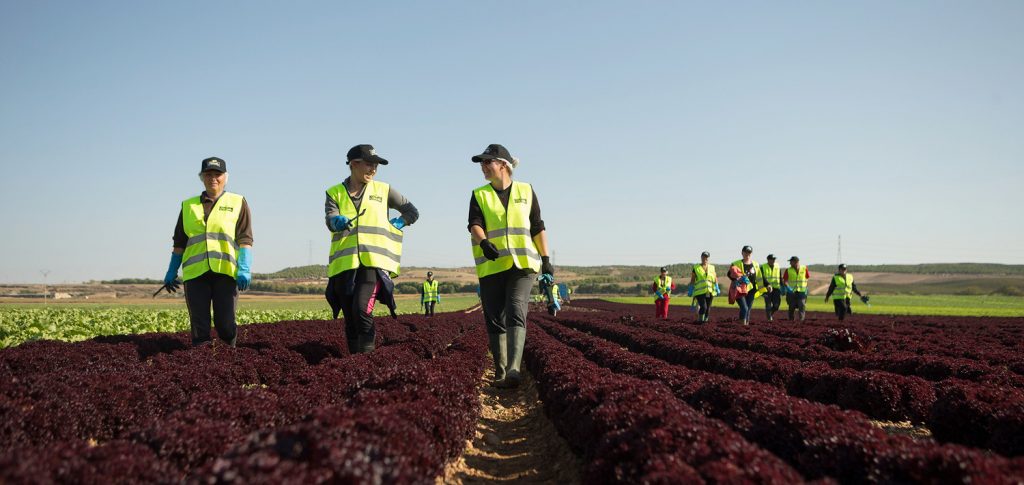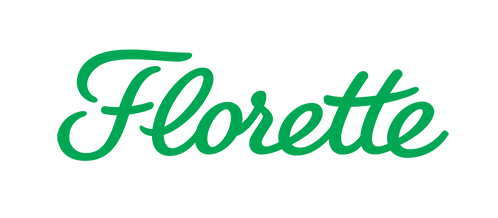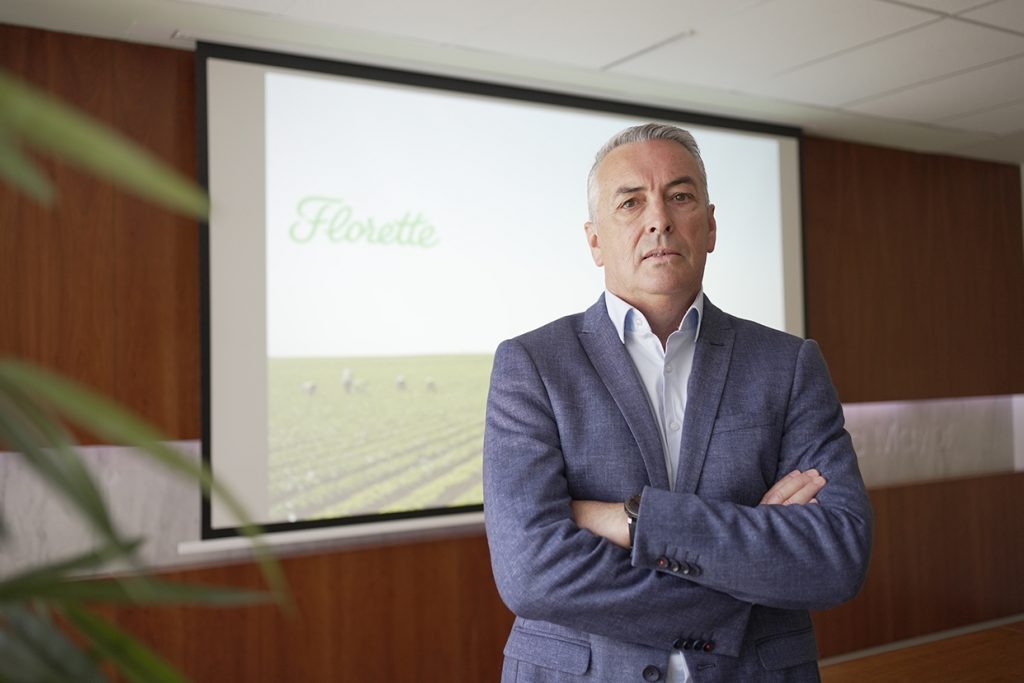
Florette is one of the best known brands of Navarre origin worldwide. Its founders opened up a new market niche at the end of the 1980s by creating disruptive products such as packaged salads. In just thirty years, the company’s managers have managed to position Florette as one of the 50 favorite FMCG brands among consumers, according to the consulting firm Kantar. From its origins until today, the company’s ownership was transformed with the acquisition of the French multinational Agrial, but this change hardly altered the way in which the company is governed. In this interview, Jorge Moreno, CEO of the company, tells us about the absolute confidence that the Navarrese management has in the group to develop its activity in the Iberian Peninsula. This confidence has been answered with continuous growth based on open collaboration and innovation. The recent opening of a business R&D&I center with the support of the Government of Navarra is a clear example of this.
Florette Ibérica is a project that began at the end of the 80’s, between 88 and 89. It was an initiative led by two young people from Navarre who, with the help of some businessmen, also friends from the region, embarked on this adventure, which at first took the name of Vega Mayor. And I say adventure because although at the time it was not given much relevance, it meant the creation of a new category in the fruit and vegetable sector in Spain: the pre-prepared convenience food category.
In the 1990s, and especially in 1992, two important events took place in our country. One was the Olympics and the other Expo 92. In a way, both events served as a showcase to make our product visible, which at that time was totally unknown.
This is how we reached the year 2001 when, already with a company of a certain size, other operators, especially European, were interested in our business with the aim of expanding their activities. There were several interested companies, all of them international, and finally it was Agrial, a French cooperative, which took over practically all of what was then Vega Mayor. The purchase took place in 2001, coinciding with the inauguration of this factory where we are now, which in turn is the headquarters of Florette Ibérica, and from where we serve the Iberian market: Spain and Portugal.
In 2001 we introduced the Florette brand in the market. But the acquisition did not entail major changes at the operational level. We keep our headquarters in Navarra and the entire management team of the company is Spanish, the vast majority of us from Navarra. We can say that from the beginning, and also today, we enjoy the absolute confidence of the group to develop the business in the Iberian Peninsula.
Florette Ibérica is part of the group’s fresh fruit and vegetables division of Agrial, which is concentrated in the Iberian Peninsula, France, the British Isles and Central Europe. We make up one of the most relevant business units in terms of volume of activity within the group.
Since the beginning, and especially since Agrial joined the group, we have not stopped growing. At the time of the acquisition, we had only one factory. Today we own six production centers distributed throughout the Iberian Peninsula and the Canary Islands and a very important development of agricultural activity, which in those early years was practically non-existent. Therefore, if we stick to history, I am convinced that the ownership will continue to bet and invest in the activities in the Iberian Peninsula.
This is a very interesting question because in the beginning we were not fully aware of the importance that raw materials would have in the development of the business as a whole. The company’s proposal was a total innovation, a complete novelty. The promoters of this business initially considered the producers of the Navarrese riverside, since it is an area with a well established culture in the production of vegetables.
However, this choice implied difficulties that had to be solved. Fresh vegetables that are marketed in the first range are not the same as those that have to undergo a minimum process, which is what is required to be suitable for sale in the pre-prepared convenience food range. This was one of the biggest difficulties at the beginning: finding raw materials suitable for the process required for industrialization in the pre-prepared convenience food range.
We got down to work and in parallel developed partnerships with local farmers. Within our model, we have always been committed to being close to agricultural production and also close to the areas of consumption. Fundamentally because we work with a perishable product with a very, very short shelf life. It is very important to be close to both production, at the beginning of the chain, and to the end, consumption. This has been clear to us practically from the beginning.
I would focus on three fundamental aspects that need to be addressed. We need to improve infrastructure in two areas. On the one hand, we must increase the size of the surface area of the plots. On the other hand, we must optimize irrigation infrastructures. The most important project in our community is the Navarre Canal, which links the community from north to south, and it is very important that it is completed to bring water to the south in the right conditions, since that is precisely where we have the agro-industrial and agro-climatic conditions to develop agricultural activity.
Another backbone is to continue promoting generational renewal. And for this, we must train young people and offer them incentives, that is, ensure that they can develop a life project with agricultural activity.
Innovation is in our DNA. We always say that the success of the company in its beginnings was thanks to a great innovation: to generate a new category within the fruit and vegetable market, the pre-prepared convenience food we have been talking about before. But, from that moment on, innovation has continued to be part of our company culture.
Specifically, the decision to promote the business R&D&I unit came about as a result of a new law of the Government of Navarre, which gives private companies the possibility of competing in calls for funding innovation projects with a similar status to that of technology centers or universities.
Florette Ibérica was the second company in Navarra to carry out the necessary actions to achieve this characterization as a business R&D&I unit. With this, what we are pursuing is to have access to those calls for funding that until recently were exclusive to technology centers and universities.
Secondly, to continue reinforcing the culture of innovation in the organization, because it requires us to have a team dedicated exclusively to the R&D&I unit and to the projects developed under its umbrella. This also allows us to consolidate much closer and more fluid relationships with technology centers, universities and other companies in the community. In fact, we are currently participating in almost twenty multi-company innovation projects, generally led by universities, CNTA, INTIA or CSIC. There are a multitude of projects, both community and national, even European.
To mention just a few of them, I will focus on two blocks. The first is related to respect and care for the environment and sustainability. In this area, I would highlight two projects. Firstly, AgroPaper, which aims to replace plastic mulch used in agriculture to reduce water and herbicide consumption with organic paper mulch. The second noteworthy project is FoodRUs, which seeks to promote circular economy by avoiding food waste generated in the food industry and promoting its reuse. Both projects are participated by companies from Navarre, Spain and abroad. The first is led by CNTA and the second by the University of Deusto.
The second block I would highlight is related to the incorporation of new technologies such as artificial intelligence to obtain information in real time and facilitate decision-making. These are also projects with international participation, which include many companies, coordinated in many cases by technology centers or the University of Navarra. In this sense, the two most outstanding projects are IAFood, in which we collaborate with the University of Navarra, INTIA and CNTA, as well as numerous companies from Navarra and other regions, and AgrarIA, coordinated by the CSIC, Centro Superior de Investigaciones Científicas.
I believe that, as a matter of principle, collaboration in our industry is fundamental. We will not be up to what the market and our customers require of us if we are not able to partner. And I am not only referring to technology centers and universities, but also among ourselves, the industrial companies. I think it is key and indisputable that we have to go to one in terms of collaborative innovation. If we promote these projects independently, it will cost us a lot of time and money and we will not achieve results with the agility required by consumers and the market. Therefore, I am convinced of collaborative innovation.
In Navarra we have two production centers that represent approximately 50% of the total volume. Our product has a very short shelf life and we need to be very close to production and very close to the centers of consumption. And, in addition, with this we favor biodiversity and care for the environment because we move the product as little as possible.
Therefore, we produce here in Navarra as much as we can from the climatic point of view. In the case of protected crops, we produce here twelve months of the year and, as far as outdoor crops are concerned, we produce here mainly in spring and autumn, which is when we enjoy favorable environmental conditions. In winter, we logically continue to produce in other regions that guarantee us the conditions required for the good development of the crops.
Our relationship with these centers is historical, dating back many years, and it provides us with clear benefits such as being close to professionals with high capacities and very important knowledge. Having them close and accessible is an asset first to protect and second to develop with the links we manage to formalize. An example of the latter is that we are the vice-president of CNTA, so we are very closely linked to them historically.
We are a very small part of this project. The initiative, as you have said, arose here in Navarra and that is why today it is being led from Navarra. But today it has become a project of national scope, with the participation of companies from up to 16 autonomous communities, which gives it a global character. The objective is logically to take better and coordinated advantage of the resources that we are going to receive with the Next Generation Funds and to try to modernize the industry and the sector. I think it would be absurd not to take advantage of this.
I would point out four key factors. The first has to do with tradition. This has traditionally been an entrepreneurial land and, therefore, this is something that is in the DNA of this region and that is very important to take into account.
Secondly, we have traditionally been very close to the administrations, which favors the implementation of projects. Thirdly, I would like to highlight the capacities in terms of training and talent that exist in this community, which is very important when it comes to launching projects. Finally, I would also like to highlight the recent commitment to innovation in all areas of the community.

